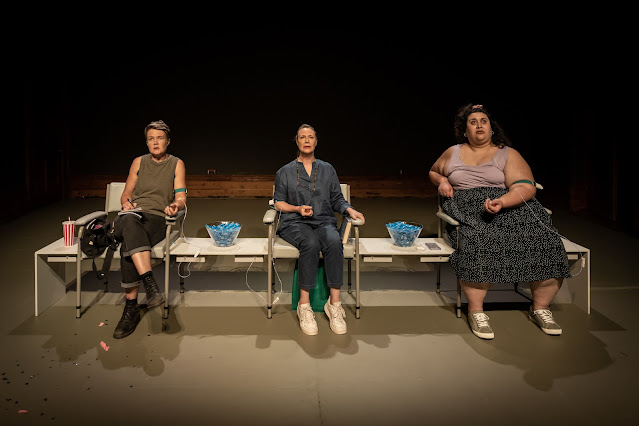Three.
Three
women.
Three women
sit silently, set an equal distance apart, each with a cannula inserted into
their hands.
Three women
sit silently, set an equal distance apart, each with a cannula inserted into
their hands, donating plasma at a blood bank in Melbourne.
They are
there when the audience walks into the theatre. They sit, reading a book or
their phone, fidgeting as we find our seats and chatter amongst ourselves
before the lights go down.
The play
has already started, of course. The thing about giving plasma is that the wait
is part of the experience. You cannot go anywhere. You’re hooked in.
They sit in
a room surrounded by televisions, all tuned to the same network. Like donating blood
at Harvey Norman. But they’ve come prepared to wait. Lou is writing in her
journal. Grace is reading Go Set a Watchmen for her book club. Juice is
scrolling endlessly on her phone.
Small talk
starts. It’s pleasant and awkward in equal measure. You never know if other
people want to talk and if you don’t want to talk, it’s not like you can leave.
Lou is a
social worker. Grace used to volunteer at this very blood bank. Juice has just
moved to Melbourne and all her emergency contacts are still in Sydney.
The women
are just getting to know each other when… all the televisions, tuned to the
same network, start showing footage of the Manchester Arena attack. Shrapnel
bombs detonated as young girls and women are leaving the concert.
And now the
women, giving plasma, hooked in, can’t get away or look away. Not even when the
news runs out of new footage and starts playing the same images over and over
again.
And now
their talk is no longer small. It grows larger and larger.
Olivia
Satchell’s follow up to, my sister feather, and the third in her trilogy
on grief, let bleeding girls lie, is an exploration of caring for
others, even when you have only just met them. Or you see their pain streamed to
your device from across the other side of the world.
All three
women in the play – Lou, Grace and Juice – are beautifully rendered in the
exquisite writing and the nuanced performances.
Emily Tomlins
tells us so much about Lou in the way she peels open a mentos with one hand and
her teeth, and scrawls endlessly in her journal before and after the attack.
Belinda McClory layers in a lot of hurt and loss and disillusionment in Grace,
when on the surface she says things that make her seem like a dreaded Karen.
Chanella Macri plays Juice as if her history is pressing her down so much that
even the smallest act of kindness is both heart-breaking and a huge relief.
Olivia
Satchell’s script and direction are insightful and generous. We are brought
into these women’s lives gently and she takes our hand and helps us through the
waiting and the sorrow and the grief.
There was
one false moment for me, at the end of the play, where a song is used to focus
all the pain and to perhaps to illicit an outpouring of emotion. I think it's a
pity that, though the song is beautiful, the play was not allowed to end on its
own grace note. The play had already moved me in subtle waves. I don’t
think it needed this torrent.
At one
point, early in the play, Grace and Juice discuss the reason they are even at
the blood bank. They recognise that it’s partly motivated by feeling good about
themselves; there is an element that’s not entirely selfless.
But they
are donating plasma, not just blood. They are going a step above. Even in a
world where nail bombs are exploded at a concert, when things seem hopeless,
small acts of kindness and connection are invaluable.
Some of
that help might include waiting.
And there’s
never nothing to be done.
Let bleeding girls lie closes at La Mama today after a sold out season.
Olivia Satchell’s Grief Trilogy will be presented at La Mama Courthouse in March 2023. They are raising money for this season now, at the Australian Cultural Fund.
Photographs: Darren Gill


Comments